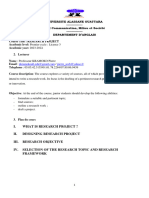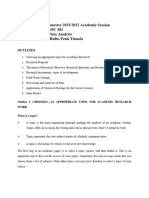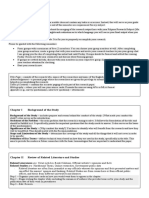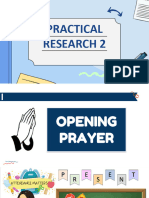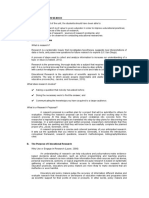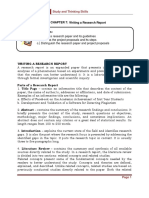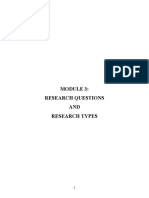Module 2. Research Problem Formulation
Uploaded by
guihulngan cityModule 2. Research Problem Formulation
Uploaded by
guihulngan cityP299: Research Methods in Planning
Module 2. Research Problem Formulation
Introduction
In this module, you will begin your journey as a researcher and planner. You are
expected to increase your sensitivity of your surroundings and formulate your research
question based on the issues and concern that you observed, read, and review. You will
be introduced to the process of reviewing the existing literature to build your research
topic and draw from it to develop your objectives and hypothesis. You are also expected
to have an approved topic for your mini-research at the end of this module.
Learning Objectives
At the end of this module, you are expected to:
1. Differentiate research problems from research objectives and hypotheses;
2. Distinguish the different types of hypotheses;
3. Differentiate the types of variables;
4. Formulate the research problem, objectives, and hypotheses for their research
proposal;
5. Discuss the purpose of literature review in research;
6. Conduct a search of the literature;
7. Write a literature review of their approved research topic.
Doing Literature Review
The research process always starts with the identification of a research problem. This
can be based on old or current issues and concern of the discipline. This can also
emanate from a review of literature that can show the existing gaps or new areas of
study. An extensive literature review also allows a comprehensive view of the problem
understudy including the state of the art in the identified topic.
The reading explains what literature review means. It includes strategies in writing
literature reviews for the humanities, social sciences, and sciences.
Read: The Writing Center, “Literature Reviews” (n.d.). University of North
Carolina at Chapel Hill. Retrieved from
http://writingcenter.unc.edu/handouts/literature-reviews/
Watch: Literature Reviews: An Overview for Graduate Students. [Video file].
(n.d.). In NCSU Libraries. Retrieved
from http://www.lib.ncsu.edu/tutorials/litreview/
P299: Research Methods in Planning
This video discusses the types of literature that can be used for the literature review and
its purpose in research.
Guide questions:
1. What is the importance of doing a literature review?
2. How can you organize your literature review?
3. What are the existing information about my topic of interest?
4. What are the gaps in knowledge that my study can focus on?
Formulating your Research Question
After the review of related literature, now is the time to formulate your research
question. What are the characteristics of a good research question you ask? In the
readings and the video below, you will be guided on how to formulate your research
question.
Read: What makes a good research question? Thompson Writing Program –
Duke University. Retrieved from
https://sites.evergreen.edu/mediaworks1516/wp-
content/uploads/sites/121/2016/03/Research.pdf
This reading describes the characteristics of a good research question and how to make
them.
Read: Simmi K. Ratan, Tanu Anand, and John Ratan. 2019 Jan-
Mar. Formulation of Research Question – Stepwise Approach. J Indian Assoc
Pediatr Surg. 24(1): 15-20. doi: 10.4103/jiaps.JIAPS_76_18 . Retrieved
at https://www.ncbi.nlm.nih.gov/pmc/articles/PMC6322175/
This provides the students guides on how to formulate research questions.
Guide questions:
1. What makes a good research question?
2. What are the possible sources or basis of a research question?
Activity 1. Writing your research question
Basic Considerations for choosing your research:
1) Time – it should be finished by the end of the Semester
2) Resources – you have enough resources at your disposal to undergo the
research
3) Generation of knowledge – what new knowledge will it result to
4) Contribution to planning – what can it contribute to the planning practice
P299: Research Methods in Planning
Activity: Exercise 1 Research Problem Formulation – Worksheet 1
Research Topic:
Research Question:
Topic Outline of Literature Review:
References*:
*Citations should follow the APA format
style: read https://owl.english.purdue.edu/owl/resource/560/01/
P299: Research Methods in Planning
References
The Writing Center, “Literature Reviews” (n.d.). University of North Carolina at Chapel
Hill. Retrieved from http://writingcenter.unc.edu/handouts/literature-reviews/
Literature Reviews: An Overview for Graduate Students. [Video file]. (n.d.). In NCSU
Libraries. Retrieved from http://www.lib.ncsu.edu/tutorials/litreview/
What makes a good research question? Thompson Writing Program – Duke University.
Retrieved from hhttps://sites.evergreen.edu/mediaworks1516/wp-
content/uploads/sites/121/2016/03/Research.pdf
Simmi K. Ratan, Tanu Anand, and John Ratan. 2019 Jan-Mar. Formulation of Research
Question – Stepwise Approach. J Indian Assoc Pediatr Surg. 24(1): 15-
20. doi: 10.4103/jiaps.JIAPS_76_18. Retrieved
at https://www.ncbi.nlm.nih.gov/pmc/articles/PMC6322175/
APA Formatting Write Guide. Copyright ©1995-2016 by The Writing Lab & The OWL at
Purdue and Purdue University. Retrieved
from https://owl.english.purdue.edu/owl/resource/560/01/
You might also like
- 14 Chapter 3 Lesson 1 the Research Proposal 1No ratings yet14 Chapter 3 Lesson 1 the Research Proposal 117 pages
- Introduction To Qualitative Research MethodsNo ratings yetIntroduction To Qualitative Research Methods8 pages
- Guidelines For Writing A Thesis 09 - 19 - 1No ratings yetGuidelines For Writing A Thesis 09 - 19 - 138 pages
- Identifying The Inquiry and Stating The Problem100% (1)Identifying The Inquiry and Stating The Problem38 pages
- Midterm Module in Lang Educ Research 22 23No ratings yetMidterm Module in Lang Educ Research 22 2318 pages
- Inquiries, Investigations & Immersion (M 1-3)No ratings yetInquiries, Investigations & Immersion (M 1-3)6 pages
- Discussion of The Format of The Concept PaperNo ratings yetDiscussion of The Format of The Concept Paper4 pages
- Chapter I. Nature of Research Objectives: at The End of The Unit, The Students Should Have Been Able ToNo ratings yetChapter I. Nature of Research Objectives: at The End of The Unit, The Students Should Have Been Able To14 pages
- Ljmu-7505-Pubuni - Topic Overview Week 2No ratings yetLjmu-7505-Pubuni - Topic Overview Week 212 pages
- SOC231 Qualitative Research Course Outline April To July 2022No ratings yetSOC231 Qualitative Research Course Outline April To July 20227 pages
- Writing Chapters 1, 2, and 3 of The Research Proposal100% (3)Writing Chapters 1, 2, and 3 of The Research Proposal6 pages
- Hasri Qurratu Aini 17322035 UTS EDU RESEARCH-dikonversiNo ratings yetHasri Qurratu Aini 17322035 UTS EDU RESEARCH-dikonversi19 pages
- MODULE 3, Research Questions and Research TypesNo ratings yetMODULE 3, Research Questions and Research Types18 pages
- Preparing - A - Research - Proposal - Prof. Chandra ANo ratings yetPreparing - A - Research - Proposal - Prof. Chandra A14 pages
- Thinking as Researchers Innovative Research Methodology Content and MethodsFrom EverandThinking as Researchers Innovative Research Methodology Content and MethodsNo ratings yet
- Agriculture Contributes Heavily To The Economy of The City of GuihulnganNo ratings yetAgriculture Contributes Heavily To The Economy of The City of Guihulngan3 pages
- Activity 5 - Correlation and Regression AnalysisNo ratings yetActivity 5 - Correlation and Regression Analysis9 pages
- Essays on the Impact of Financial Education on Financial Nehaviour 2017No ratings yetEssays on the Impact of Financial Education on Financial Nehaviour 2017191 pages
- Circus, Science and Technology: Dramatising Innovation 1st ed. Edition Anna-Sophie Jürgens pdf download100% (1)Circus, Science and Technology: Dramatising Innovation 1st ed. Edition Anna-Sophie Jürgens pdf download56 pages
- Full Download Technology Based Assessments for 21st Century Skills Theoretical and Practical Implications from Modern Research 1st Edition Michael C. Mayrath PDF DOCX100% (5)Full Download Technology Based Assessments for 21st Century Skills Theoretical and Practical Implications from Modern Research 1st Edition Michael C. Mayrath PDF DOCX50 pages
- Immediate Download Managing The University Campus Information To Support Real Estate Decisions 1st Edition Alexandra Den Heijer Ebooks 2024100% (4)Immediate Download Managing The University Campus Information To Support Real Estate Decisions 1st Edition Alexandra Den Heijer Ebooks 202462 pages
- The Impact of Using Micro-Selection As A Learning Model On Iraqi College Student's Achievement in Reading ComprehensionNo ratings yetThe Impact of Using Micro-Selection As A Learning Model On Iraqi College Student's Achievement in Reading Comprehension5 pages
- Bahria University (Lahore Campus) : Application Form For Receiving DegreeNo ratings yetBahria University (Lahore Campus) : Application Form For Receiving Degree1 page
- Resume of Senator Ferdinand - Bongbong - R. Marcos, Jr. - Senate of The PhilippinesNo ratings yetResume of Senator Ferdinand - Bongbong - R. Marcos, Jr. - Senate of The Philippines2 pages
- College Planning Checklist - For Seniors 1 PSRBPJNo ratings yetCollege Planning Checklist - For Seniors 1 PSRBPJ5 pages
- Timo 2023 Heat Round - Philippines Full ListNo ratings yetTimo 2023 Heat Round - Philippines Full List125 pages
- Chapter I. Nature of Research Objectives: at The End of The Unit, The Students Should Have Been Able ToChapter I. Nature of Research Objectives: at The End of The Unit, The Students Should Have Been Able To
- SOC231 Qualitative Research Course Outline April To July 2022SOC231 Qualitative Research Course Outline April To July 2022
- Writing Chapters 1, 2, and 3 of The Research ProposalWriting Chapters 1, 2, and 3 of The Research Proposal
- Hasri Qurratu Aini 17322035 UTS EDU RESEARCH-dikonversiHasri Qurratu Aini 17322035 UTS EDU RESEARCH-dikonversi
- Preparing - A - Research - Proposal - Prof. Chandra APreparing - A - Research - Proposal - Prof. Chandra A
- Thinking as Researchers Innovative Research Methodology Content and MethodsFrom EverandThinking as Researchers Innovative Research Methodology Content and Methods
- How To Excel in Academic Research for All DisciplinesFrom EverandHow To Excel in Academic Research for All Disciplines
- Agriculture Contributes Heavily To The Economy of The City of GuihulnganAgriculture Contributes Heavily To The Economy of The City of Guihulngan
- Essays on the Impact of Financial Education on Financial Nehaviour 2017Essays on the Impact of Financial Education on Financial Nehaviour 2017
- Circus, Science and Technology: Dramatising Innovation 1st ed. Edition Anna-Sophie Jürgens pdf downloadCircus, Science and Technology: Dramatising Innovation 1st ed. Edition Anna-Sophie Jürgens pdf download
- Full Download Technology Based Assessments for 21st Century Skills Theoretical and Practical Implications from Modern Research 1st Edition Michael C. Mayrath PDF DOCXFull Download Technology Based Assessments for 21st Century Skills Theoretical and Practical Implications from Modern Research 1st Edition Michael C. Mayrath PDF DOCX
- Immediate Download Managing The University Campus Information To Support Real Estate Decisions 1st Edition Alexandra Den Heijer Ebooks 2024Immediate Download Managing The University Campus Information To Support Real Estate Decisions 1st Edition Alexandra Den Heijer Ebooks 2024
- The Impact of Using Micro-Selection As A Learning Model On Iraqi College Student's Achievement in Reading ComprehensionThe Impact of Using Micro-Selection As A Learning Model On Iraqi College Student's Achievement in Reading Comprehension
- Bahria University (Lahore Campus) : Application Form For Receiving DegreeBahria University (Lahore Campus) : Application Form For Receiving Degree
- Resume of Senator Ferdinand - Bongbong - R. Marcos, Jr. - Senate of The PhilippinesResume of Senator Ferdinand - Bongbong - R. Marcos, Jr. - Senate of The Philippines











